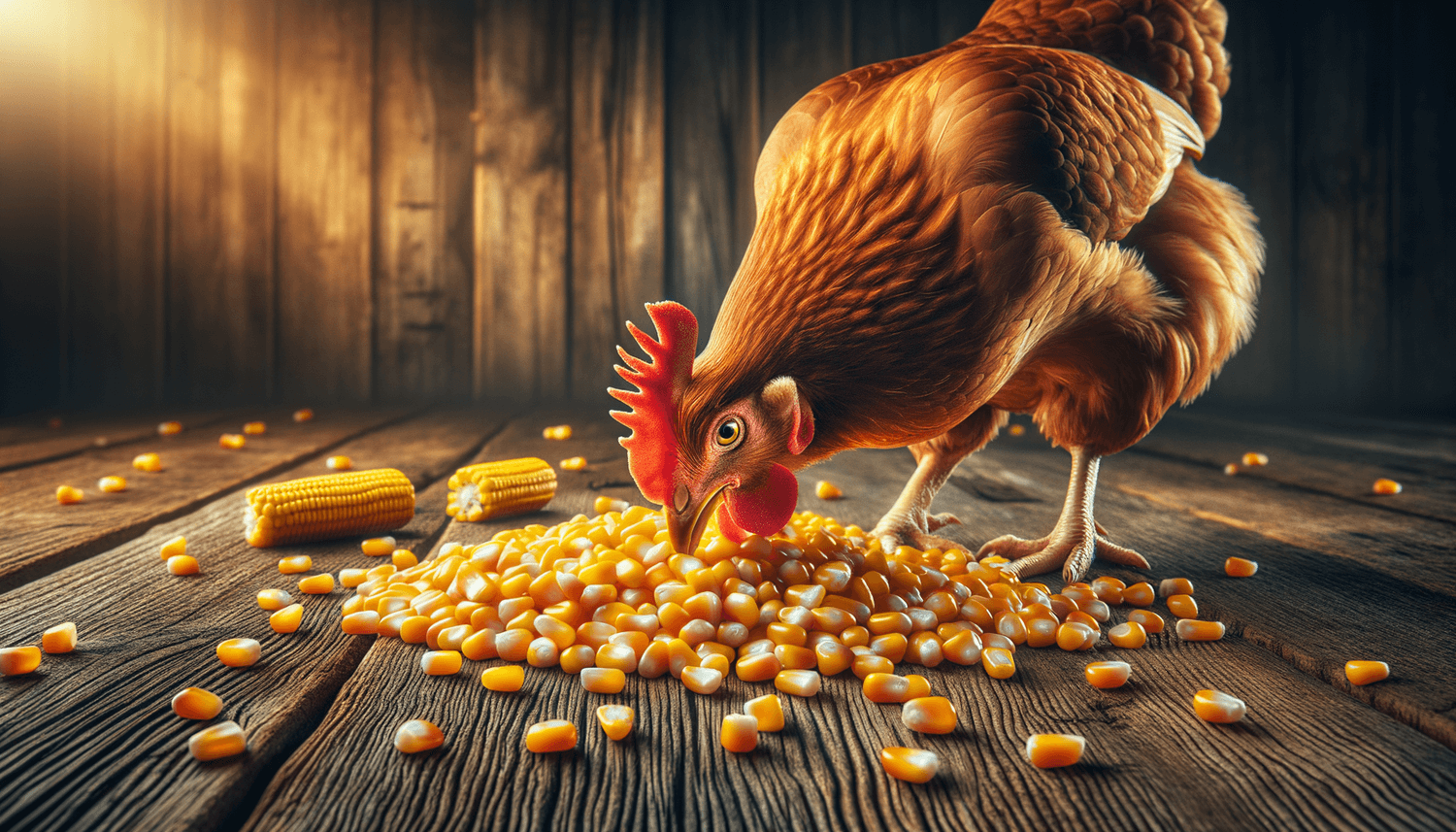Welcome to the wonderful world of backyard chickens and their love affair with corn! 🌽 Have you ever found yourself pondering whether or not it’s safe to share this golden goodness with your feathered friends? Well, buckle up because we’re about to dive into the world of corn-loving cluckers, exploring if they can eat corn or not, the importance of a balanced diet, benefits and/or risks, nutritional value, and how to prepare this scrumptious treat for your chickens. So sit back, grab a cob, and let’s get cracking!
Can chickens eat corn?
Yes, chickens can indeed eat corn, and it is safe for them. Corn serves as a delicious treat that can provide them with energy during colder months. However, it is important to consider corn only as a supplement to their regular diet and not the primary source of nutrition, as a balanced diet is essential for their overall health and well-being.
A balanced diet for happy, healthy chickens
Just like humans, chickens thrive on a well-balanced diet to stay healthy and strong. To achieve this balance, a chicken’s diet should primarily consist of a high-quality chicken feed. You might be wondering, what does this chicken feed entail? Well, it’s a specially formulated blend of grains, seeds, vitamins, and minerals that ensures your flock receives all the essential nutrients they need to grow and flourish.
Chicken feed should make up around 80-90% of their diet, as it delivers the right balance of protein, carbohydrates, fats, minerals, and vitamins for optimal health. Now, as for the remaining 10-20% of their diet, that’s where you can have some fun! Chickens enjoy treats like fruits and vegetables – think of these as the ‘dessert’ to their main course of chicken feed. However, it’s important to remember that these tasty treats should only act as a supplement, and not displace the crucial role that chicken feed plays in their diet.
Nutritional value of corn for chickens.
Feeding corn to chickens does offer some nutritional value. Corn is an excellent source of carbohydrates, which can provide the necessary energy that chickens need, especially during colder months when their bodies require more fuel to stay warm. Additionally, corn is known for being high in dietary fiber which aids digestion and supports gut health.
While corn does have some vitamins and minerals like vitamin A, vitamin C, calcium, and potassium, it’s comparatively lower in these essential nutrients than high-quality chicken feed or other nutritious treats like leafy greens, fruits, and vegetables. Yet, corn does have one unique advantage – it has a notable moisture content, and including it in their diet can aid in hydration to some extent.
So, feeding corn to chickens has a few benefits like providing energy, supporting digestion, and offering minor amounts of essential vitamins and minerals. Keep in mind, however, that corn alone won’t meet all of their nutritional needs, and it’s best to offer it as a treat alongside a well-rounded diet.
Nutrition table of corn for chickens.
| Information | Description |
|---|---|
| Nutritional Value | Good source of carbohydrates and fiber, minor amounts of vitamins and minerals. |
| Suggested Serving Size | Treat only, shouldn’t exceed 10-20% of the chicken’s diet. |
| Safe Feeding Practices | Offer corn as a treat in moderation, alongside a balanced diet. |
| Preparation | Can be fed raw or cooked, on the cob or off. Just avoid any additives or seasoning. |
| Potential Risks | Feeding too much can cause obesity and nutritional imbalances. |
| Hydration | Helps with hydration due to its high moisture content. |
| Digestion | Dietary fiber in corn supports gut health. |
| Seasonal Availability | Available year-round but freshest during summer and autumn months. |
| Other Benefits | Provides energy boost during colder months. |
Preparing corn for your chickens
When it comes to feeding corn to your chickens, you have several options for preparation. You can choose to serve them raw or cooked corn, either on the cob or off. Chickens love pecking kernels straight from the cob, making it a fun and interactive snack. Just make sure to avoid adding any salt, butter, or seasonings, as these can be harmful to your chickens’ health.
If you have access to a farmer’s market or a local grocery store, you can also find cracked corn, which is corn kernels that have been broken into smaller pieces. This is an excellent choice for smaller, younger chickens, as it is easier for them to eat and digest. Remember to store cracked corn in a cool, dry place to maintain its freshness and prevent spoiling.
Alternatives to corn for variety
While corn makes for a delightful treat, it’s essential to offer your chickens a variety of treats to provide them with a broader range of nutrients. Nutritious options include fruits and vegetables like apples, pears, berries, spinach, and cucumbers. These can provide essential vitamins and minerals, which are not as abundant in corn.
Another interesting treat for your chickens is mealworms or insects! They are rich in protein, and chickens adore the taste. In addition to providing variety, they also make an excellent substitute for corn during the seasons when fresh corn isn’t as readily available.
A healthy flock is a happy flock
Ultimately, the key to maintaining a healthy and happy flock of chickens is to provide them with a balanced diet, a mix of high-quality chicken feed, and a variety of treats. Corn is just one of the delicious treats you can share with your flock, but remember always to offer it in moderation. As your chickens enjoy their corn and other nutritious snacks, you’ll be rewarded with a thriving, lively, and contented flock!

















